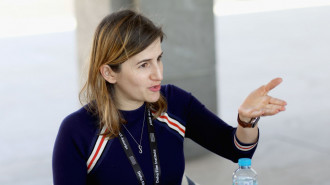
Inshallah A Boy: Jordan's debut entry at Cannes film festival confronts its patriarchal character

The first Jordan film ever selected by the Cannes Film Festival, Amjad Al Rasheed’s debut feature Inshallah A Boy is a highly emotional drama and a strong cri de coeur against the oppression imposed by the country’s heavily patriarchal society.
Showcased in Critics’ Week, the picture was awarded the Gan Foundation Award for Distribution, worth €20,000.
The story, penned by Al Rasheed himself with Rula Nasser and Delphine Agut, zooms in on 30-year-old Nawal (played by Palestinian actress Mouna Hawa).
After the sudden death of her husband, the young woman embarks on a fight to keep her part of the inheritance in order to save her daughter Nora (Celina Rabab’a) and her home.
"Inshallah A Boy works in three ways: it is a compelling contemporary drama about a woman fighting alone against the world, a social realist piece addressing Jordan’s societal contradictions, and, above all, a touching mother and daughter tale"
In the blink of an eye, the fate of Nawal and her social position change radically. After her husband’s demise, her voice matters little and she is now seen as someone unreliable and unable to take care of her daughter.
She is not treated as a person who can choose freely, but as someone who can only submit to her relatives and eventually remarry another man.
Predictably, we realise that this unjust treatment is the result of widespread prejudices but is also supported by an unfair legal conundrum which sees property ownership as an exclusively male domain, although with rare exceptions.
Things get more complicated for Nawal when her brother-in-law Rifqi (Hitham Omari) tells her that he has lent her late husband a large sum of money.
On the surface, the man seems concerned about Nawal and Nora and claims his good intentions, but he is ultimately determined to get his money back to make ends meet as soon as possible.
Rifqi repeatedly suggests selling her husband’s pick-up truck to pay him back, but Nawal refuses and tries to buy time. The pick-up truck emerges as a quite obvious – but still effective – metaphor for Nawal’s strong desire for independence. She prefers to sell her bedroom furniture rather than obey Rifqi’s orders and let him take full control over her life.
Meanwhile, the woman’s brother, Ahmed (Mohammad Al Jizawi) feels like he is being caught between two fires. On the one hand, he acts more or less sympathetically towards his sister; on the other hand, he finds Rifqi’s concerns – and demands – quite reasonable.
Inevitably, Nawal ends up entering a downward spiral that makes her life more and more troubled. Nawal, who works as a nurse for a wealthy Christian family headed by old Souad (Salwa Nakkara), manages to befriend Lauren (Yumna Marwan) who agrees to help the woman in exchange for a positive pregnancy test.
Proving Nawal’s pregnancy is one of the few, viable solutions to delay court proceedings. Despite their different socio-economic statuses and beliefs, Lauren and Nawal are both victims of their patriarchs – in her case, Lauren admits that her husband is a serial cheater and feels powerless as as Nawal.
|
On the whole, Amjad Al Rasheed’s directorial approach brings nothing new under the sun, but it does a fair job.
In detail, the camera doesn’t move too often and frames the subjects closely and intimately. Moreover, the locations’ set design (courtesy of Nasser Zoubi) and the film’s overall look (lensed by Japanese DoP Kanamé Onoyama) are essential but realistic enough.
However, what is plain to see on screen are the heartfelt performances and the excellent writing of the characters’ dialogues. The strong script and casting choices clearly show Al Rasheed’s genuine motivation to explore the film’s main themes.
In his director’s notes, Al Rasheed disclosed that the picture was inspired by the struggle of a close relative who dedicated her life to her family's service and lived with a man who made her gradually unrecognisable to herself.
“When her husband died, according to the current laws, the inheritance was supposed to be distributed amongst the deceased’s closest kin because the couple only had daughters. However, the late husband’s siblings waived their share to ensure that she and her daughters stayed in their own house, telling her: ‘We allow you to live in your home.’ They were exceptional, but also, they were financially fine. The sentence ‘We allow you’ raised many questions in my mind.”
“What if they did not? What options would have been available to her if they had demanded a share of her house as specified by the law? These questions fuelled the film’s idea, showing the lack of control many women experience over their fate and how easily their rights are transgressed,” the helmer explained.
Al Rasheed’s debut bodes well for his future career. Commendably, Inshallah A Boy works in three ways: it is a compelling contemporary drama about a woman fighting alone against the world, a social realist piece addressing Jordan’s societal contradictions, and, above all, a touching mother and daughter tale.
Davide Abbatescianni is an Italian Film Critic and Journalist based in Rome
Follow him on Twitter: @dabbatescianni
![Nawal battles both family and society to be free [photo credit: Amjad Al Rasheed]](/sites/default/files/styles/medium_16_9/public/2023-06/pic0400165835-copie.jpg?h=7dea5ee4&itok=Z2uBUthG)






 Follow the Middle East's top stories in English at The New Arab on Google News
Follow the Middle East's top stories in English at The New Arab on Google News


